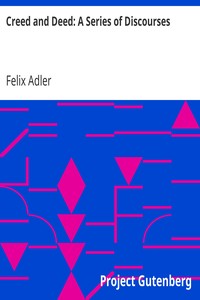Creed and Deed: A Series of Discourses by Felix Adler
"Creed and Deed: A Series of Discourses" by Felix Adler is a collection of philosophical lectures published in the late 19th century. The book explores themes of morality, religion, and the nature of belief, focusing on the importance of ethical action over dogmatic adherence to creeds. Adler highlights the differences in individual convictions and critiques the limitations of traditional religious doctrines, advocating for a new moral framework. At the start of this
work, Adler introduces the founding principles of a society organized around the motto "not by the creed but by the deed." He discusses the challenges posed by rigid theological tenets and emphasizes the necessity of uniting people through common moral values rather than divisive beliefs. He begins by examining the concept of immortality, presenting a critical analysis of its basis in human experience and the often flawed arguments used to justify its acceptance. Adler argues that focusing on ethical actions and the moral law should take precedence over the quest for theological certainty, setting the tone for a thoughtful discourse on the intersection of belief and ethical responsibility. (This is an automatically generated summary.)
Read or download for free
| How to read | Url | Size | |||
|---|---|---|---|---|---|
| Read now! | https://www.gutenberg.org/ebooks/37697.html.images | 436 kB | |||
| EPUB3 (E-readers incl. Send-to-Kindle) | https://www.gutenberg.org/ebooks/37697.epub3.images | 231 kB | |||
| EPUB (older E-readers) | https://www.gutenberg.org/ebooks/37697.epub.images | 238 kB | |||
| EPUB (no images, older E-readers) | https://www.gutenberg.org/ebooks/37697.epub.noimages | 232 kB | |||
| Kindle | https://www.gutenberg.org/ebooks/37697.kf8.images | 426 kB | |||
| older Kindles | https://www.gutenberg.org/ebooks/37697.kindle.images | 402 kB | |||
| Plain Text UTF-8 | https://www.gutenberg.org/ebooks/37697.txt.utf-8 | 387 kB | |||
| Download HTML (zip) | https://www.gutenberg.org/cache/epub/37697/pg37697-h.zip | 224 kB | |||
| There may be more files related to this item. | |||||
Similar Books
About this eBook
| Author | Adler, Felix, 1851-1933 |
|---|---|
| Title | Creed and Deed: A Series of Discourses |
| Contents | Immortality -- Religion -- The new ideal -- The priests of the ideal -- The form of the new ideal -- The religious conservatism of women -- Our consolations -- Spinoza -- The founder of Christianity -- The first anniversary discourse -- Appendix: The evolution of Hebrew religion. Reformed Judaism. |
| Credits | Produced by David Widger |
| Reading Level | Reading ease score: 55.8 (10th to 12th grade). Somewhat difficult to read. |
| Language | English |
| LoC Class | BL: Philosophy, Psychology, Religion: Religion: General, Miscellaneous and Atheism |
| Subject | Religion |
| Subject | Ethics |
| Subject | Ethical culture movement |
| Category | Text |
| EBook-No. | 37697 |
| Release Date | Oct 10, 2011 |
| Most Recently Updated | Jan 26, 2013 |
| Copyright Status | Public domain in the USA. |
| Downloads | 309 downloads in the last 30 days. |
| Project Gutenberg eBooks are always free! | |

